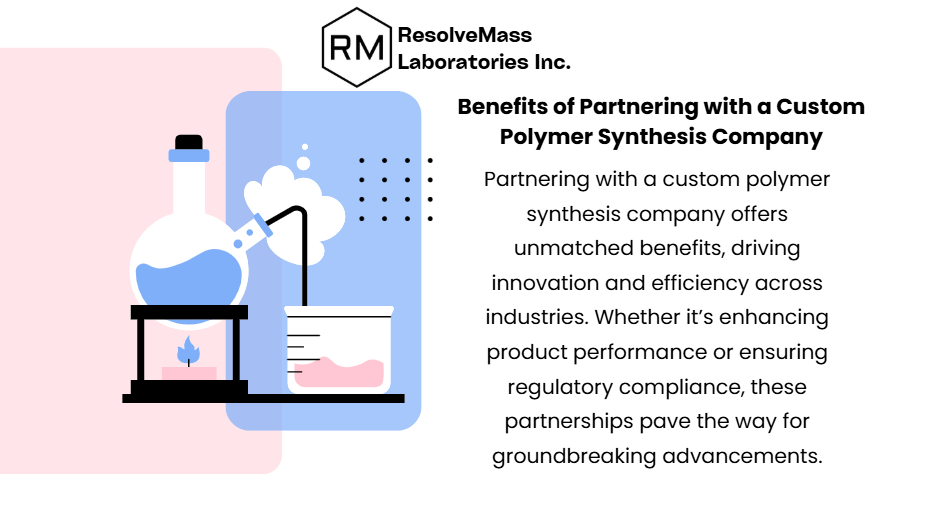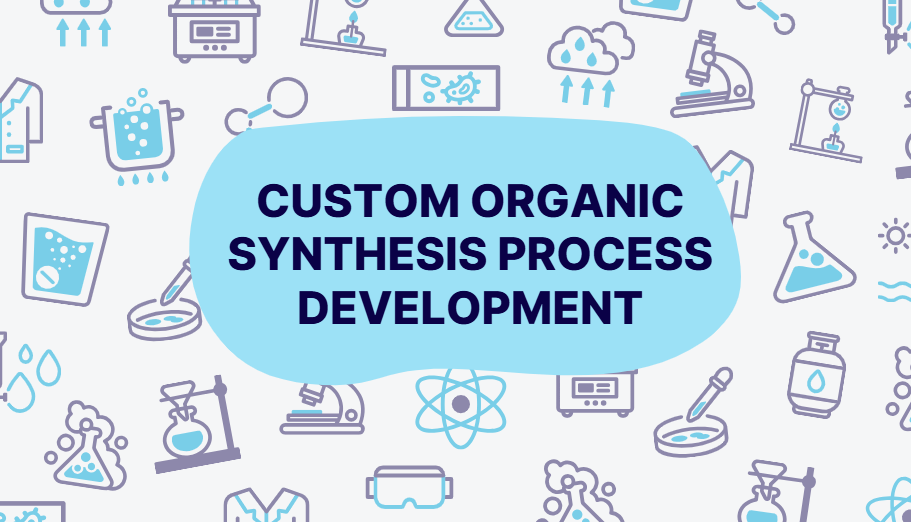
Polymers have become integral to advancements in numerous industries, including pharmaceuticals, electronics, automotive, aerospace, and healthcare. These versatile materials are the backbone of innovation, enabling the development of products with enhanced performance, sustainability, and cost efficiency. However, off-the-shelf polymers often fail to meet the unique demands of specialized applications. This is where a custom polymer synthesis company comes into play.
By partnering with a custom polymer synthesis company, businesses gain access to tailored solutions, expert guidance, and cutting-edge technology. This blog explores the benefits of such partnerships, highlighting their impact on innovation, sustainability, and competitive advantage.
What Is Custom Polymer Synthesis?
Custom polymer synthesis refers to the process of designing and producing polymers with specific properties to meet particular requirements. Unlike generic polymers, custom-made polymers are engineered for precise functionality, enabling companies to overcome unique challenges and achieve breakthrough results. For example, in pharmaceuticals, custom polymers can enhance drug delivery systems, while in electronics, they contribute to the development of flexible circuits. These tailored materials are the result of collaborative efforts between businesses and polymer synthesis experts who leverage advanced chemistry and technology to deliver innovative solutions
Key Benefits of Partnering with a Custom Polymer Synthesis Company
Tailored Solutions for Unique Challenges
Custom polymer synthesis companies create materials designed to meet specific application requirements.
This approach ensures optimal performance, durability, and functionality, regardless of the complexity of the task.
For instance, aerospace industries require lightweight, high-strength polymers resistant to extreme conditions—a challenge that off-the-shelf materials often fail to address.
Access to Expertise and Advanced Technology
Leading custom polymer synthesis companies have teams of polymer chemists and engineers with extensive knowledge.
They employ state-of-the-art equipment and methodologies to create next-generation materials.
Collaboration with such experts ensures innovative solutions that meet the latest industry standards and trends.
Cost Efficiency and Resource Optimization
Outsourcing polymer synthesis reduces the need for in-house R&D investments.
Companies save on infrastructure, equipment, and workforce training.
By focusing on their core operations, businesses can allocate resources more effectively.
Accelerated Development Timelines
Custom polymer synthesis companies streamline the design, prototyping, and testing processes.
Their expertise accelerates project timelines, enabling faster product launches.
This speed is crucial in competitive industries where time-to-market can determine success.
Enhanced Product Performance
Tailor-made polymers often surpass the performance of generic alternatives.
They ensure reliability, longevity, and efficiency, directly impacting product quality and customer satisfaction.
Compliance with Regulatory Standards
Custom polymer synthesis companies understand the stringent regulatory requirements of industries like healthcare and aerospace.
They ensure that materials meet all necessary certifications, such as FDA and ISO standards, reducing compliance risks.
Focus on Sustainability and Environmental Benefits
Many custom polymer synthesis companies prioritize eco-friendly solutions.
They develop polymers that are biodegradable, recyclable, or derived from renewable resources.
These sustainable materials reduce environmental impact and align with global green initiatives.
Industries Benefiting from Custom Polymer Synthesis
Pharmaceuticals
Custom polymers enable controlled drug release, targeted delivery, and improved biocompatibility.
Example: Polymers designed for sustained drug delivery systems ensure consistent therapeutic effects.
Electronics
Polymers with high electrical conductivity, thermal stability, and flexibility are essential for advanced electronics.
Example: Flexible polymers are used in wearable devices and organic light-emitting diodes (OLEDs).
Automotive
Lightweight, durable polymers enhance fuel efficiency and reduce emissions.
Example: Custom polymers are used for under-the-hood components and lightweight interiors.
Aerospace
High-performance polymers withstand extreme temperatures, pressures, and mechanical stress.
Example: Advanced composites made from custom polymers improve aircraft fuel efficiency.
Healthcare
Biocompatible and sterilizable polymers are critical for medical devices and implants.
Example: Custom polymers are used in prosthetics, surgical tools, and diagnostic devices.
Real-World Applications: Case Studies
Pharmaceutical Innovation
A leading pharmaceutical company partnered with a custom polymer synthesis firm to develop a polymer for drug-eluting stents. The result was a groundbreaking product that improved patient outcomes and reduced complications.
Automotive Lightweighting
An automotive manufacturer collaborated with a custom polymer synthesis company to create lightweight polymers for vehicle parts. This innovation reduced the vehicle’s weight by 15%, significantly improving fuel efficiency and lowering emissions.
Aerospace Advancements
An aerospace company required a polymer capable of withstanding extreme conditions. By partnering with a custom synthesis firm, they developed a material that enhanced the durability and safety of aircraft components.
Choosing the Right Custom Polymer Synthesis Company
- Technical Expertise
Evaluate the company’s experience in polymer chemistry and application-specific solutions. - Quality Assurance
Ensure the company adheres to rigorous testing protocols and maintains high-quality standards. - Customization Capabilities
Look for a partner capable of developing polymers tailored to your unique needs. - Sustainability Practices
Collaborate with companies committed to eco-friendly and sustainable polymer solutions. - Customer Support
Choose a partner that provides comprehensive support throughout the product development lifecycle.
The Future of Custom Polymer Synthesis
The field of custom polymer synthesis is continuously evolving, driven by advancements in technology and changing market demands. Emerging trends include:
1. Nanotechnology Integration:
The use of nanopolymers in applications like drug delivery and advanced coatings.
2. Smart Polymers:
Materials that respond to environmental stimuli, such as temperature or pH changes.
3. Bio-based Polymers:
Development of sustainable polymers from renewable resources.
4. 3D Printing:
Custom polymers designed for additive manufacturing enable rapid prototyping and production.
REFERENCES
- Ligon SC, Liska R, Stampfl J, Gurr M, Mülhaupt R. Polymers for 3D printing and customized additive manufacturing. Chemical reviews. 2017 Aug 9;117(15):10212-90.
- Lewis JD. Partnerships for profit: Structuring and managing strategic alliances. Simon and Schuster; 2002.
- Bally F, Serra CA, Hessel V, Hadziioannou G. Homogeneous polymerization: benefits brought by microprocess technologies to the synthesis and production of polymers. Macromolecular Reaction Engineering. 2010 Sep 23;4(9‐10):543-61.
GET IN TOUCH
These partnerships not only drive technological advancements but also enhance product quality, sustainability, and compliance. By choosing the right partner, companies can unlock new opportunities and achieve a competitive edge in their respective industries.
End-to-End Biomarker Bioanalytical Services Offered by a CRO: Capabilities and Expectations
Introduction Biomarker bioanalytical services CRO partnerships have become indispensable in modern pharmaceutical development, providing the…
Regulatory-Compliant Biomarker Bioanalytical Services for FDA and Health Canada Submissions
Introduction Biomarker bioanalytical services for FDA and Health Canada submissions require rigorous compliance with regulatory…
Outsourced Medicinal Chemistry for Startups: Cost, Speed, and Scientific Advantages
🔍 Summary (Key Takeaways) Outsourced medicinal chemistry for startups offers a strategic advantage by minimizing…
Why Early-Stage Biotech Companies Outsource Chemistry Services to Drug Discovery CROs
Introduction Early-stage biotech companies are increasingly adopting Outsourced Chemistry Services for Biotech to stay competitive…
Why Early-Stage Biotech Companies Outsource Bioanalytical Services to CROs
Introduction Outsourced bioanalytical services play a critical role in helping early-stage biotech companies overcome scientific,…
7 Questions to Ask Before Collaborating with a Full Service Drug Discovery CRO
Summary Before partnering with a Full Service Drug Discovery CRO, the following key questions can…







